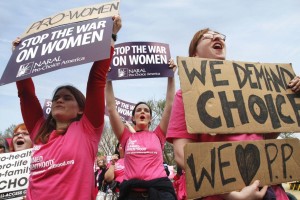By Stephanie Cervino
This year marks the 20th anniversary of the International Conference on Population and Development where nations across the globe, including the United States, declared that reproductive rights are human rights. Over the past two decades, much progress has been made. Yet, around the world, 222 million women in developing countries who want to plan and space their families still lack access to modern birth control and 47,000 women die from the inability to access a legal abortion with an experienced provider. While right here on our campus students can visit the Planned Parenthood office within Student Health Services to obtain sexual and reproductive health services and birth control, off campus and abroad, we still have our work cut out for us.

To tackle these significant challenges, in 2015 government members of the United Nations will set new global development goals. And they’ve issued a call for people around the world to contribute to this process by defining the “World We Want” in an online survey and on social media. Beginning last month for International Women’s Day and continuing this spring around major UN conferences, including the Commission on Population and Development, supporters of women’s health and rights are responding to that call with a manifesto defining the world we want.Planned Parenthood Affiliates of New Jersey (PPNJ) work to make the world we want a reality every day. For nearly 100 years, Planned Parenthood has worked to improve women’s health and safety, prevent unintended pregnancies, and advance the right and ability of individuals and families to make informed and responsible choices. And PPNJ is uniquely positioned to engage in UN processes as global citizens — over 20 percent of our state’s population was born in countries other than the U.S., so lawmakers in the state have a particular duty to represent the interests of these global stakeholders. To that end, here’s a little more about the world we want.
In the world we want, access to health care doesn’t depend on your postal code. Or your gender. Or your sexual identity. Or the language you speak. Or the color of your skin.
In the world we want, the College has zero sexual assaults, zero unintended pregnancies and zero obstacles to comprehensive and respectful health services for all students.
In the world we want, politicians don’t come between a woman and her health care provider.
In the world we want, girls are just as likely as boys to stay in school, go after the jobs they want and become leaders in their communities.
In the world we want, there are no new HIV infections, and those living with HIV are able to make decisions about their health and lives, just like anybody else.
In the world we want, young people are empowered and trusted with information about sex so they can prevent unintended pregnancy and protect themselves from STDs.
In the world we want, all people have equal protection and equal benefit under the law.
The world we want is free of stigma, discrimination and violence. And reproductive rights are recognized as human rights. The world we want acknowledges that the only way forward is to protect and expand these rights. In the world we want, all people control their own bodies and their own destinies. This is the world we want. And this is the world we’ll fight for.



